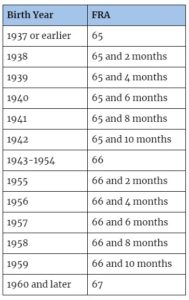The RSSA Team
August 14, 2023 Retirement

Pamela Kweller RSSA Staff
The Social Security Act was signed into law by President Franklin D. Roosevelt on August 14, 1935 which means Social Security celebrates its 88th birthday today!
What birthday will you be celebrating next? Are you approaching retirement? Do you plan on collecting Social Security in the near future?
Here are the most important birthdays to keep in mind as they can have a direct impact on your retirement and Social Security income.
Once you turn 50, you are permitted to make catch-up contributions to your 401(k)s and IRAs. Putting aside additional money will help build your retirement fund, while allowing it to grow tax-deferred. For IRAs, you can put in an extra $1,000 each year and for 401(k)s, you can put in an extra $6,500 each year.
Once you turn 59 ½, you can start withdrawing money from your retirement accounts without penalty. Prior to 59 ½, you can still withdraw but will be charged with a 10% early withdrawal penalty fee.
At age 60, a widow(er) is eligible to collect survivor Social Security benefits. Keep in mind, there will be a reduction in benefits at this age because it is prior to the widow(er)’s Full Retirement Age.
At age 62, you can begin to collect Social Security benefits if you choose to do so.
Age 62 is the earliest you can collect benefits, but it will also result in a permanent reduction of benefits. At age 62, you will only receive 75 percent of your PIA (Primary Insurance Amount) or full retirement benefit.
While you can file at age 62, it may or may not be the best time for you and your particular situation. An RSSA can help you determine the best time to file.
At age 65, you become eligible for Medicare.
Medicare is our country’s health insurance program for people who are 65 or older. There are some exceptions such as coverage for younger people who receive Social Security disability benefits and coverage for people who may be suffering from specific fatal illnesses.
For everyone else, Medicare coverage begins at age 65. Even if your spouse is 65 or older, you cannot obtain Medicare coverage until you are 65.
At some point between ages 65 and 67, you will have turned your Full Retirement Age (FRA). Your FRA is dependent on the year you were born. Check out the chart below to see what your FRA is.

Your FRA is the age at which you will receive the full monthly benefit you have earned from all the years you have contributed into the Social Security system. The amount of this monthly benefit is unique to you and is determined by a complex calculation.
This monthly benefit is referred to as your PIA. PIA stands for Primary Insurance Amount. Your PIA is the monthly Social Security benefit you have earned and are entitled to if, and only if, you choose to claim at your FRA.
If you choose to claim your benefits at your FRA, you will receive 100% of your PIA or monthly benefit. However, if you choose to claim your benefits earlier than your FRA such as age 62, your monthly payment will be reduced. On the other hand, if you choose to claim your benefits after your FRA, your monthly payment will be increased up until age 70.
Age 70 is the latest you can file for benefits. Age 70 is also when you will receive the maximum monthly benefit, 132 percent of your PIA. After age 70, your benefits will no longer increase so it is important that if you haven’t applied for benefits yet, do so immediately!
Age 73 is the age at which retirement plan participants need to take required minimum distributions (RMDs). This age was changed from 70 ½ to 72 through the SECURE Act in 2020, but the SECURE 2.0 Act made even more changes including a higher RMD age. Now, at age 73 you are required to take a withdrawal from your IRA or other qualified retirement account. In 2033, the RMD age will increase again to age 75.
No matter which birthday is coming up for you, take the time to plan for your retirement and Social Security. An RSSA can help you make the optimal Social Security decision, giving you greater financial security during retirement.
Photo by Adi Goldstein on Unsplash